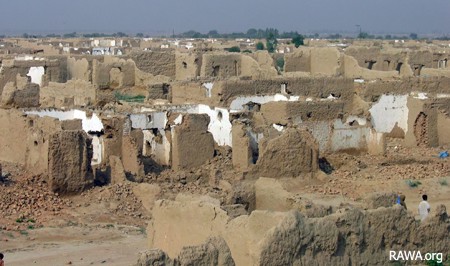PESHAWAR, Ghazala Khan, 17, often has dreams about Kabul, the capital of neighbouring Afghanistan, where her parents grew up.
However, born to parents who reached adulthood and married in Pakistan, Ghazala is aware that Kabul is no longer what it may have been in the past, and is far from certain that she wishes to return.

RAWA: Khewa camp in suburbs of Peshawar which was forcibly closed down by Pakistan government and hundreds of refugee families went to Afghanistan towards uncertain and unsecured future.
"I have cousins in Kabul whom I have never met. But then I also hear that the city is still full of broken buildings, that living costs there are very high and that there is a great deal of insecurity," Ghazala told IRIN. She is torn between wishing to see the city her parents talk nostalgically of, and staying on in Peshawar, where she now has roots.
"I am going to college here. I'm not sure if I could do that in Kabul," says Ghazala. The fact that her father is Hazara, belonging to an ethnic minority group that has faced consistent discrimination in Afghanistan, most notably under the former Taliban regime, further complicates decision-making for the family.
The UN Refugee Agency (UNHCR) has repatriated 3.3 million Afghans since 2002, including 120,000 from Pakistan in 2008, but some two million registered Afghan refugees remain in Pakistan. The number of unregistered refugees is unknown.
Many, like Ghazala's family, are torn between a desire to return and fears that this may place them in a perilous situation in Afghanistan, given that the economic and security situation in the country is still fragile.
"My uncle went back in 2005, but they have slipped back into Pakistan. They say things there are very grim. Now we will stay here," says Dilbaz Khan, 28. He complained of harassment by police in Peshawar, but said: "This is still better than the situation in Afghanistan."
The largest number of refugees is in the North West Frontier Province. However, as the bigger camps in the province have been shut down, some have been switched to camps in Punjab Province, in line with Pakistani government policy. The refugees have been termed a “security threat” by the government in the past.
There is also a small population of refugees in the southwestern province of Balochistan, from where returns have been slow. Only 5,000 refugees have returned from the province this year. Khalid Mahgoub, the UNHCR's field protection officer in Quetta, attributes this to the fact that “many refugees here are from southern regions of Afghanistan where the security situation has been worsening."
Kamran Arif, a prominent lawyer and human rights activist based in Peshawar, agrees. "Naturally, no refugee wants to return to an unsafe situation, and conditions in Afghanistan are often unsafe," he told IRIN.
Carpet weavers
Among the refugees who remain on in Peshawar are around 600 carpet weavers, based at the now defunct Jalozai Camp. Though the camp was closed a few weeks ago, and most of the 70,000 refugees who lived there moved back to Afghanistan, the Pakistan authorities agreed to allow the carpet weavers to stay at the camp. A programme under which these highly skilled weavers would train locals is planned.
Maqbool Shah Roghani, in charge of the repatriation process at Jalozai camp, said all the buildings at the camp, including a university hospital, had been handed over to the Peshawar district administration.
But even as refugees continue to depart, there are Afghans who seem keen to continue to live in the only place they have known as home. "I have never been outside Peshawar. It is all I know of the world," said Ghazala.
Other younger Afghans are reluctant to go back to an Afghanistan where a great deal of insecurity persists. Reports of renewed fighting in some parts of Afghanistan and the fact that they have jobs in Pakistan explain their hesitation.
It seems likely that a considerable proportion of Afghans who came to Pakistan as refugees - in a process that began in 1979 with the Soviet invasion of their country - will choose to live on here, rather than return to a homeland that remains insecure and where economic survival is uncertain, particularly at a time when rapid food price inflation has made life especially hard.



